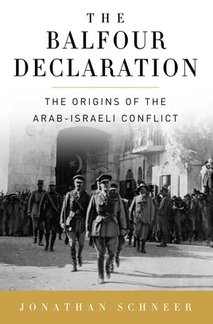
09 Aug 2010 23:41:14
From the beginning this book is talk about sources of the Arab-Israeli Conflict.
When the world war began, Palestine was a sleepy, sparsely populated area with vague borders that had been governed for centuries by Ottoman sultans. But after Turkey threw in its lot with Germany, Britain sought to dangle Palestine and other parts of the moribund Ottoman Empire as bait to win help for its war effort.
The author recounts the promises Britain made to Arabs and Jews as well as to its French ally that left each party with a conflicting vision of Palestine's postwar future, subjecting the fate of the promised land to varying interpretations.
Hussein, the grand sharif of Mecca, who launched the Arab revolt against the Turks in 1916, won promises of an Arab kingdom, but the borders of Syria, Lebanon and Palestine as well as Britain's role in what is now Iraq remained ambiguous.
At that days at the same time, British and French diplomats conspired in secret to divvy up the region, with Palestine's governance to be placed in the hands of an "international condominium."
To Schneer, Britain's Zionists were "inspired opportunists" who viewed the war with the Turks as an opportunity to win backing for their dream of a homeland in Palestine, where 85,000 resident Jews comprised one-ninth of the prewar population. Emerging as Zionist leader was Chaim Weizmann, a Russian-born chemist whose discovery of a fermentation method for a key ingredient in explosives was important to the war effortand helped win him contact with David Lloyd George before he became prime minister.
The author concludes that support for the Zionist cause owes a considerable debt to stereotypical beliefs among the British about the power and unity of world Jewry. Government officials figured that a statement of support for a Jewish homeland would generate backing for the war among American Jews and Jews in Russia.
When the world war began, Palestine was a sleepy, sparsely populated area with vague borders that had been governed for centuries by Ottoman sultans. But after Turkey threw in its lot with Germany, Britain sought to dangle Palestine and other parts of the moribund Ottoman Empire as bait to win help for its war effort.
The author recounts the promises Britain made to Arabs and Jews as well as to its French ally that left each party with a conflicting vision of Palestine's postwar future, subjecting the fate of the promised land to varying interpretations.
Hussein, the grand sharif of Mecca, who launched the Arab revolt against the Turks in 1916, won promises of an Arab kingdom, but the borders of Syria, Lebanon and Palestine as well as Britain's role in what is now Iraq remained ambiguous.
At that days at the same time, British and French diplomats conspired in secret to divvy up the region, with Palestine's governance to be placed in the hands of an "international condominium."
To Schneer, Britain's Zionists were "inspired opportunists" who viewed the war with the Turks as an opportunity to win backing for their dream of a homeland in Palestine, where 85,000 resident Jews comprised one-ninth of the prewar population. Emerging as Zionist leader was Chaim Weizmann, a Russian-born chemist whose discovery of a fermentation method for a key ingredient in explosives was important to the war effortand helped win him contact with David Lloyd George before he became prime minister.
The author concludes that support for the Zionist cause owes a considerable debt to stereotypical beliefs among the British about the power and unity of world Jewry. Government officials figured that a statement of support for a Jewish homeland would generate backing for the war among American Jews and Jews in Russia.

